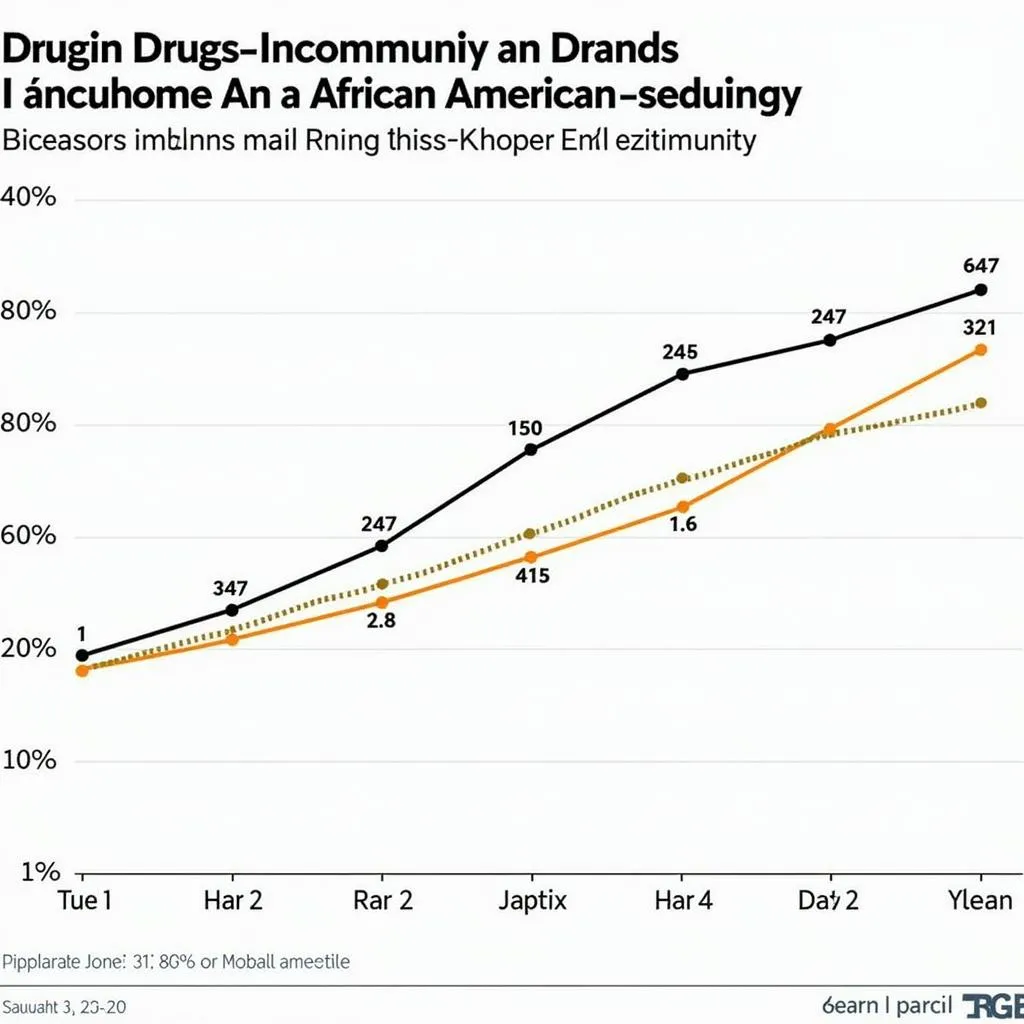Understanding African American Drug Use Statistics
African American Drug Use Statistics paint a complex picture, interwoven with historical, socioeconomic, and systemic factors. While the overall prevalence of drug use among African Americans is generally comparable to or lower than that of other racial/ethnic groups, certain patterns and disparities raise concerns. This article delves into the nuances of this critical issue, examining the data, exploring contributing factors, and shedding light on the unique challenges faced by the African American community.
Drug Use Trends within the African American Community
Examining drug use trends within specific demographics requires a nuanced approach, acknowledging that data can be influenced by various factors, including access to healthcare and reporting biases. However, looking at available data from sources like the Substance Abuse and Mental Health Services Administration (SAMHSA), we can observe some general trends:
- Marijuana: Marijuana use rates among African Americans are generally similar to those of the general population.
- Cocaine: While historically a significant concern, cocaine use has seen a decline among African Americans in recent years, although disparities in the criminal justice system related to cocaine offenses persist.
- Heroin and Opioids: The opioid epidemic, particularly involving heroin and prescription painkillers, has impacted African American communities, with alarming increases in overdose rates observed in recent years.
- Methamphetamine: While less prevalent than other substances, methamphetamine use has shown some increase in certain African American communities, raising concerns about its potential impact.
 Drug Use Trends in African American Communities
Drug Use Trends in African American Communities
Factors Contributing to Drug Use Disparities
Attributing complex social issues like drug use to a single cause is inaccurate and oversimplifies the situation. Instead, it’s crucial to understand the interplay of various factors that contribute to disparities in drug use and its consequences among African Americans:
- Socioeconomic Factors: Poverty, unemployment, and lack of access to quality education and healthcare create an environment of stress and limited opportunities, potentially increasing vulnerability to drug use and hindering access to treatment.
- Historical Trauma: Generations of systemic racism, discrimination, and disinvestment have led to trauma and mistrust in institutions, potentially impacting health-seeking behaviors and access to care.
- Targeted Marketing: The tobacco and alcohol industries have a long history of targeting African American communities with advertising and marketing campaigns, contributing to higher rates of use and related health disparities.
- Criminal Justice System: Racial disparities in drug law enforcement, sentencing, and access to treatment contribute to a cycle of incarceration and limited opportunities for individuals and communities.
Addressing Drug Use in the African American Community
Effectively addressing drug use within the African American community requires a multifaceted approach that considers the unique challenges and historical context:
- Culturally Tailored Interventions: Treatment programs must be culturally sensitive and responsive to the specific needs of African Americans, incorporating elements that address historical trauma, promote cultural identity, and provide a supportive environment.
- Community-Based Solutions: Empowering communities to develop and implement their own solutions is essential. This includes supporting community organizations, faith-based initiatives, and grassroots efforts working to prevent drug use and provide support.
- Addressing Social Determinants of Health: Investing in affordable housing, quality education, job training, and healthcare access can help alleviate the socioeconomic factors that contribute to drug use and improve overall well-being.
- Criminal Justice Reform: Addressing racial disparities in drug law enforcement, sentencing, and reentry programs is critical to breaking the cycle of incarceration and promoting rehabilitation.
 Community-Based Intervention Program
Community-Based Intervention Program
A Holistic Perspective on African American Drug Use Statistics
Understanding African American drug use statistics requires a departure from simplistic narratives. It demands acknowledging the historical and socioeconomic factors that contribute to disparities while recognizing the resilience and strengths within the community. By promoting culturally sensitive interventions, empowering communities, and advocating for equitable policies, we can work towards a future where all individuals have the opportunity to thrive, free from the burden of drug use and its consequences.
FAQs About Drug Use in the African American Community
1. Are drug use rates higher among African Americans compared to other groups?
Drug use rates among African Americans are generally comparable to or lower than those of other racial/ethnic groups. However, certain disparities exist in the types of drugs used, access to treatment, and outcomes.
2. How does historical trauma impact drug use in the African American community?
Generations of systemic racism and discrimination have resulted in trauma and mistrust, potentially impacting help-seeking behaviors and contributing to health disparities.
3. What are some culturally tailored approaches to addressing drug use?
Culturally tailored interventions consider the unique experiences of African Americans, incorporating elements that address historical trauma, promote cultural identity, and provide a supportive environment.
4. How can communities support individuals struggling with drug use?
Community-based organizations, faith-based initiatives, and support groups play a vital role in providing resources, fostering connections, and reducing stigma.
5. What role does the criminal justice system play in addressing drug use?
Reforming drug policies, addressing racial disparities in law enforcement, and providing access to treatment within the criminal justice system are crucial steps towards rehabilitation and reducing recidivism.
 Support Group for African Americans
Support Group for African Americans
Need help or have questions about substance use?
Contact us at:
Phone: +255768904061
Email: kaka.mag@gmail.com
Address: Mbarali DC Mawindi, Kangaga, Tanzania
We are available 24/7 to provide support and resources.
Explore more articles on our website:
- The Impact of Drug Policy on African American Communities
- Building Resilience: Mental Health Resources for African Americans
- Creating Equitable Access to Healthcare in Underserved Communities
Your well-being is our priority.

